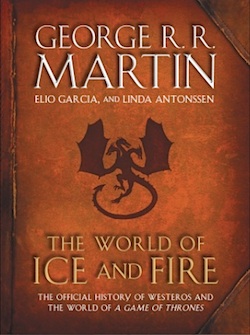The Guardian is reporting that Random House and HarperCollins have pushed back the release date of The World of Ice and Fire, the Song of Ice and Fire encyclopedia created by George R. R. Martin and series historians Elio M. Garcia and Linda Antonssen to fall 2014.
The companion book was originally slated to be an encyclopedia of the world of Westeros (and beyond), detailing the many events and notable persons that shaped the world before the events of A Game of Thrones. Originally the book was scheduled for release in November of this year. So why is it being pushed back?
It’s becoming a multi-volume affair! According to Martin’s UK publisher Jane Johnson at HarperCollins, the author was originally supposed to contribute 50,000 words to the project and ended up jotting down five times as much while chronicling the history of A Song of Ice and Fire.
When the material came in, Johnson and the authors decided to shift the focus of The World of Ice and Fire from a straightforward encyclopedia to a lushly illustrated retelling of some of the more key moments in the history of Westeros. (Such as Aegon’s Conquest, the War With the Faith, The Dance of the Dragons, the Paramours of Aegon the Unworthy, and more according to GRRM’s blog.) Martin’s chronicling of The Dance With Dragons spawned its own story, which will see release in the upcoming Tor Books anthology Dangerous Women.
Additional art has been commissioned for the project, hence the delay to 2014. (Art for epic fantasy books tends to be commissioned well in advance of the publication date for a variety of reasons.) The coffeetable format volume is now tentatively scheduled to come out in fall 2014.
And what of the further history that Martin wrote out? Some of it made its way into The World of Ice and Fire. (Garcia teases that we’ll find out more information about the new places revealed in The Lands of Ice and Fire and “the surprising person from whom the Lannisters are descended.”) But the rest will be saved for an eventual Silmarillion-esque continuation of the world’s history, according to the Guardian article.










